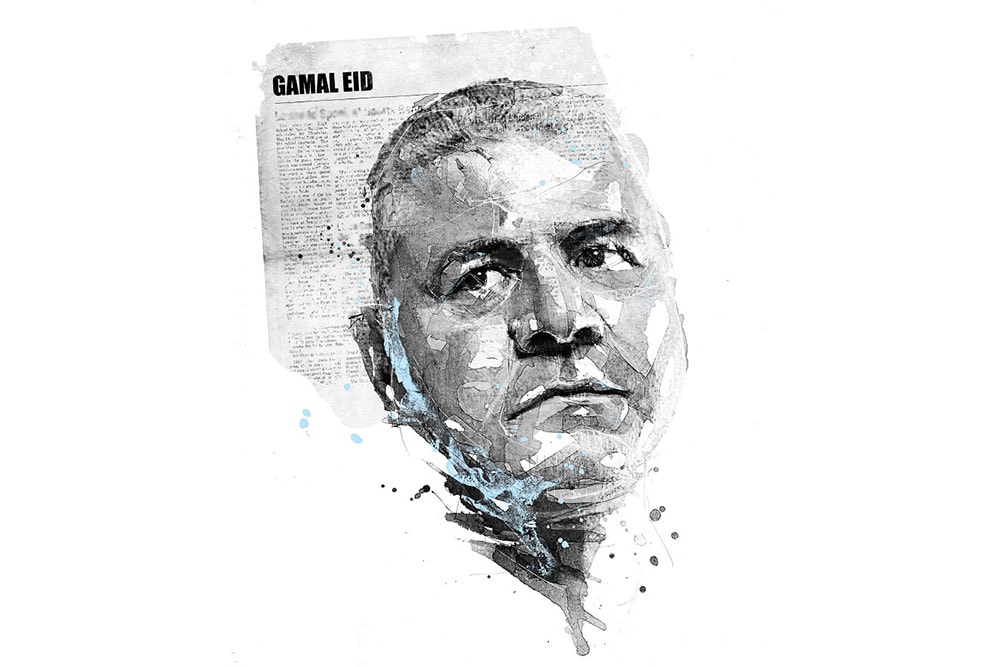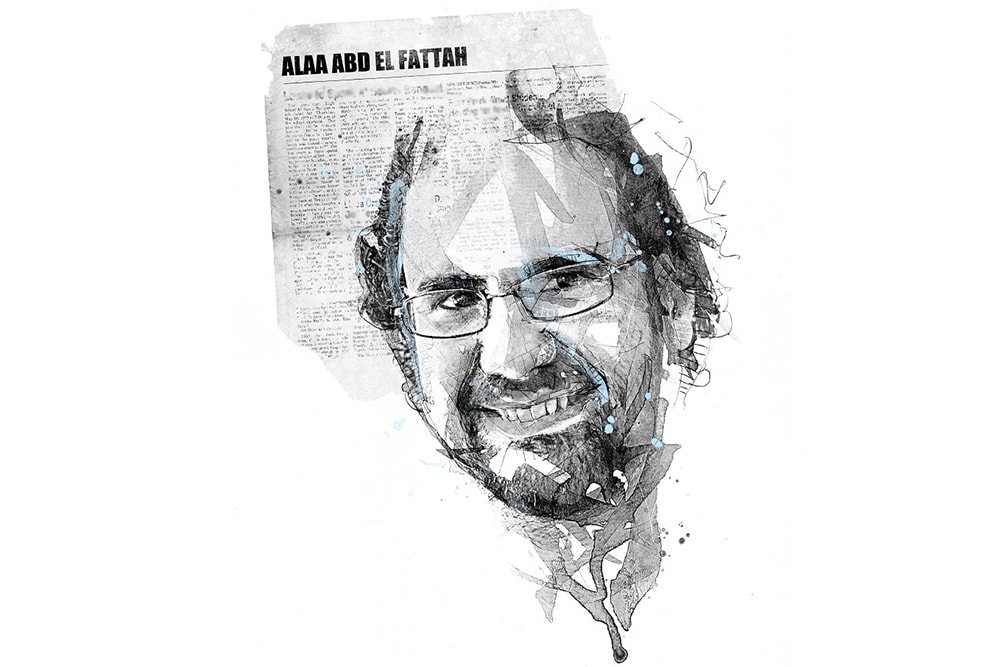Amid the chaos and crackdowns that have characterized post-revolution Egypt, prominent human rights lawyer Gamal Eid has remained steadfast in his defense of human rights for all. For that, he has been consistently hounded by a regime determined to muzzle one of the last remaining independent voices in the country.
Gamal Eid was an idealistic young man when he first joined the struggle for human rights and democracy in Egypt in 1989, shortly after graduating from Ain Shams University’s College of Law in Cairo.
At the time, Hosni Mubarak had only served a third of his term as President of the Republic of Egypt. As is the case with most authoritarian leaders, he focused much of his attention on pressuring and restricting the activities of civil society organisations. In spite of the targeted harassment and the repressive environment they were forced to operate in, civil and human rights advocates – dedicated and committed men and women like Eid – were still able to sustain and nurture a vibrant civil society sector.
In 2004, Eid founded the prominent and highly respected Arabic Network for Human Rights Information (ANHRI), a prominent and widely respected organisation which now hosts one of the most-visited websites on human rights in the Arab world. Thanks to the work of a small but dedicated group of employees, ANHRI provided essential legal support and representation for victims of violations of freedom of expression, organises trainings for journalists, campaigns on behalf of prisoners of conscience across the Middle East and North Africa, and educates the Egyptian public about their civil and human rights.
Over the 25 years Eid has worked as a human rights defender he has had to endure arrests and harassment, but the situation has further deteriorated under Abdel Fattah el-Sisi’s regime. As the Egyptian public resigns itself to living again in a militarily-controlled state that denigrates and represses much of what was celebrated and praised during the 2011 revolution, it has become all the more important to support and protect the few unwavering voices still standing their ground in the face of unprecedented oppression. Gamal Eid is one such voice that the authorities appear determined to extinguish.
Targeted attacks and harassment
In recent years, Eid has been subjected to an escalating number of violations of his rights and freedoms. On 4 February 2016, as he was about to embark on a flight to Athens, airport authorities informed him that his name had been placed on the travel ban list. He was given no reason or explanation for the ban. On 19 March, a Cairo court moved to freeze his assets, along with those of his wife and 11-year-old daughter, and on 23 May he stood before three judges on charges of accepting foreign funding without authorization – charges that since an amendment to Egypt’s penal code in 2014, can carry a penalty of life in prison. The trial had been postponed several times and finally held in September 2016. The court froze the assets of Eid and other human rights defenders.
“We have been targeted because our groups provide critical resources to those facing human rights abuses in Egypt. We have represented victims of torture from across the spectrum: Muslim Brotherhood members, liberals, leftists, victims of arbitrary arrest and even government supporters,” wrote Eid in an article for The New York Times. “We have stood for the ideas that human rights belong to all, no matter their ideology, and that civil rights belong to all citizens, no matter their wealth or power.”
Between June 2019 and December 2019, the Cairo Criminal Court repeatedly postponed appeal hearings contesting the travel ban imposed on Gamal Eid and other prominent human rights defenders, including Mozn Hassan, Hossam Bahgat, and Mohamed Zaree.
During this period, Eid was subjected to multiple attacks and physical intimidation at the hands of Egyptian authorities. In September 2019, his car was stolen. Several days later on 10 October, he was violently accosted in the street and beaten with the butt of a pistol while trying to resist the theft of his laptop and briefcase. According to reports, his phone was stolen in the incident, and he was left with cracked ribs and a bruised shoulder.
Less than a week later, on 16 October 2019, Eid’s colleague and ANHRI staff lawyer Amr Imam was kidnapped and arrested by security forces who raided his home at dawn. Imam has since appeared before the State Security Prosecution as a defendant on false charges, and currently remains in detention.
Several weeks later, on 31 October 2019, a car that Eid had borrowed from a colleague at ANHRI was smashed by security forces, with witnesses describing seven armed men that were checking out the car the evening before.
On 29 December 2019, members of Egypt’s security forces attacked Eid on the street near his home in Cairo as he waited for a taxi. About a dozen men, including a national security officer Eid recognized, threw him to the ground and beat him badly while covering him in paint from head to toe. Eid was told that he was being drenched in paint “so that he behaves himself.”
As of today, these crimes have yet to be investigated, and their perpetrators have not been held accountable.
Amidst an increasingly hostile civic space under el-Sisi’s regime, ANHRI announced in 2022 that it would be suspending its activities, in what it described as the absence of the bare minimum of the rule of law and respect for human rights in the country.
Eid and his colleagues remain determined to support the work of the few remaining independent organisations that continue to operate in the country’s repressive environment, stating: “We are filled with hope and confidence that one day this dark phase of Egypt’s history, which is flooded with violations and the absence of the law, will come to an end. Until this day comes, we, as individual lawyers, will support them and work alongside them to defend human rights and freedom of expression and to build an Egypt free from prisoners of conscience, oppression, and impunity.”
In March 2024, a Cairo Appeal Court finally dismissed the criminal lawsuit against ANHRI and other human rights organisations, ending a 13-year baseless case. Eid’s travel ban was lifted and assets unfrozen.
It is impressive that, despite these repeated attacks on Eid and his team at ANHRI, as well as the levels of corruption that pervade many facets of Egyptian society, and at a time when the el-Sisi regime is cracking down on all forms of dissent, Eid remains committed to defending human rights in Egypt.
In 2011, ANHRI was awarded the Ronald Berger Human Dignity Award for its work promoting freedom of expression and the press in Egypt and Eid himself was awarded the Leaders for Democracy award by the Project of Middle East Democracy (POMED) for his inspiring activism.
Illustration by Florian Nicolle


